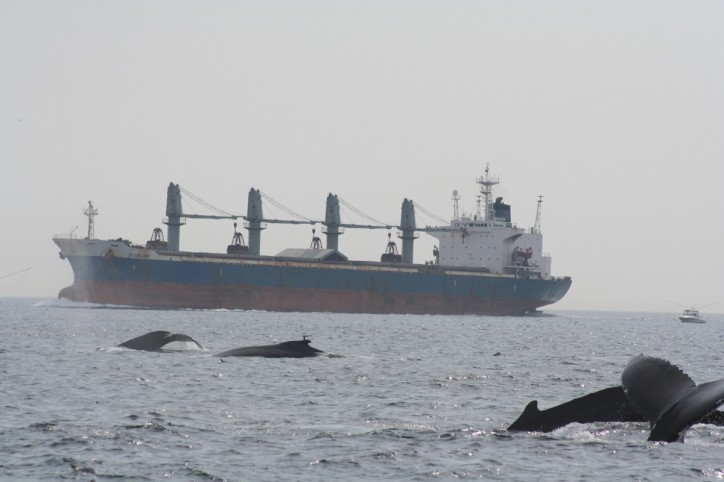Shipping noise in the North Atlantic could impact population levels of the whales, new research shows
Increased shipping noise is disrupting the foraging behaviour of humpback whales in the North Atlantic, according to a new study.
Scientists in the US and UK said their findings could impact upon the numbers of humpback whales in the long term.
Many whales are found in coastal areas with high levels of shipping traffic, which often results in frequent fatalities from collisions.
The team collected data from 10 whales within the Stellwagen Bank national marine sanctuary, which is a popular whale watching site between Cape Cod and Cape Ann in the US.

Humpback whales feeding in the shipping lanes that pass through NOAA's Stellwagen Bank National Marine Sanctuary, July 2006. Photo by K. Sardi, Whale Center of New England
They used archival tags that simultaneously recorded underwater movements and the acoustic environment to collect the data.
Scientists in the US and UK found “significant” effects on foraging, including slower descent rates and fewer side-roll feeding events per dive with increasing ship noise.
During five of 18 ship passages, dives without side-rolls were observed, they said.
Previous studies have shown that noise pollution can alter acoustic communications, distribution patterns and stress responses in a wide range of animals.
The study was carried out by Hannah Blair and Susan Parks, from Syracuse University in New York, Ari Friedlaender, from Oregon State University, Nathan Merchant, from the Centre for Environment Fisheries and Aquaculture Science in Suffolk and David Wiley from the Stellwagen Bank national marine sanctuary.
“These findings indicate that humpback whales on Stellwagen Bank, an area with chronically elevated levels of shipping traffic, significantly change foraging activity when exposed to high levels of ship noise,” the researchers said.
“This measureable reduction in within-dive foraging effort of individual whales could potentially lead to population-level impacts of shipping noise on whale foraging success.”
They said there were several potential explanations for the results.
“Whales may modify their diving behaviour in response to a perceived threat from ship noise, given that they require surface access to breathe,” they said.
The researchers said they had expected humpback whales to show some familiarisation with ship noise because they have been regularly exposed to commercial and whale watching vessels for decades.
“Therefore, it is especially interesting that alterations to foraging behaviours were detectable in this study, as it suggests that humpbacks are unable to completely adjust to this disturbance,” they said.
“These behavioural changes were also observed at night when there are fewer ship interactions compared with the day.
“Further research on the impacts of noise on daytime foraging activities and variation in the sensitivity to different age and sex classes are needed.”
They added: “These results are among the first to support that ship noise can impact humpback whales’ foraging, making this source of disturbance a management concern.
“Chronic impacts of even small reductions in foraging efficiency could affect individual fitness and translate to population-level effects on humpback whales exposed to ship noise in critical foraging areas.”
The paper, Evidence for ship noise impacts on humpback whale foraging behaviour, is published in the Royal Society’s journal Biology Letters.
Source: Press Association